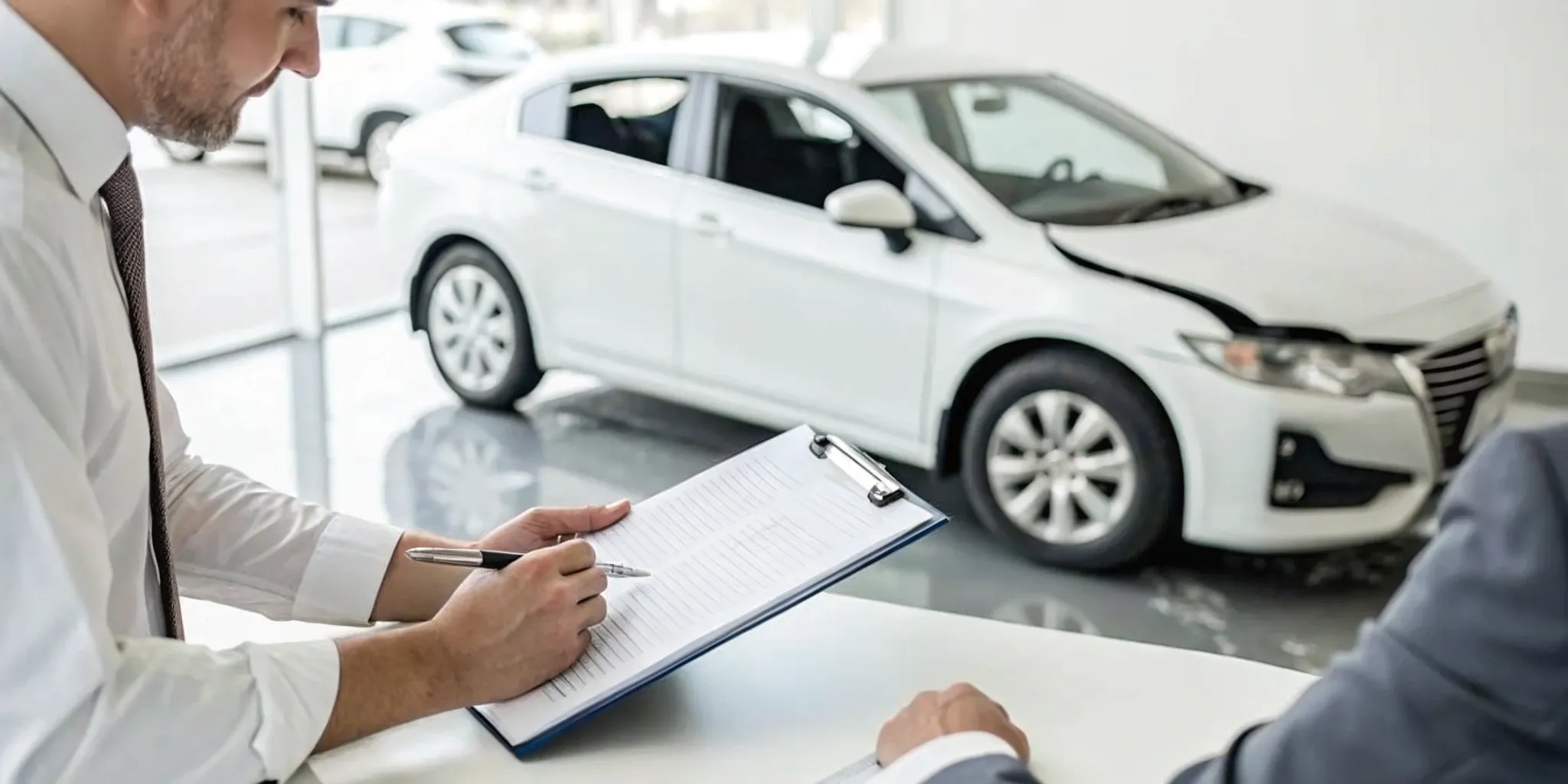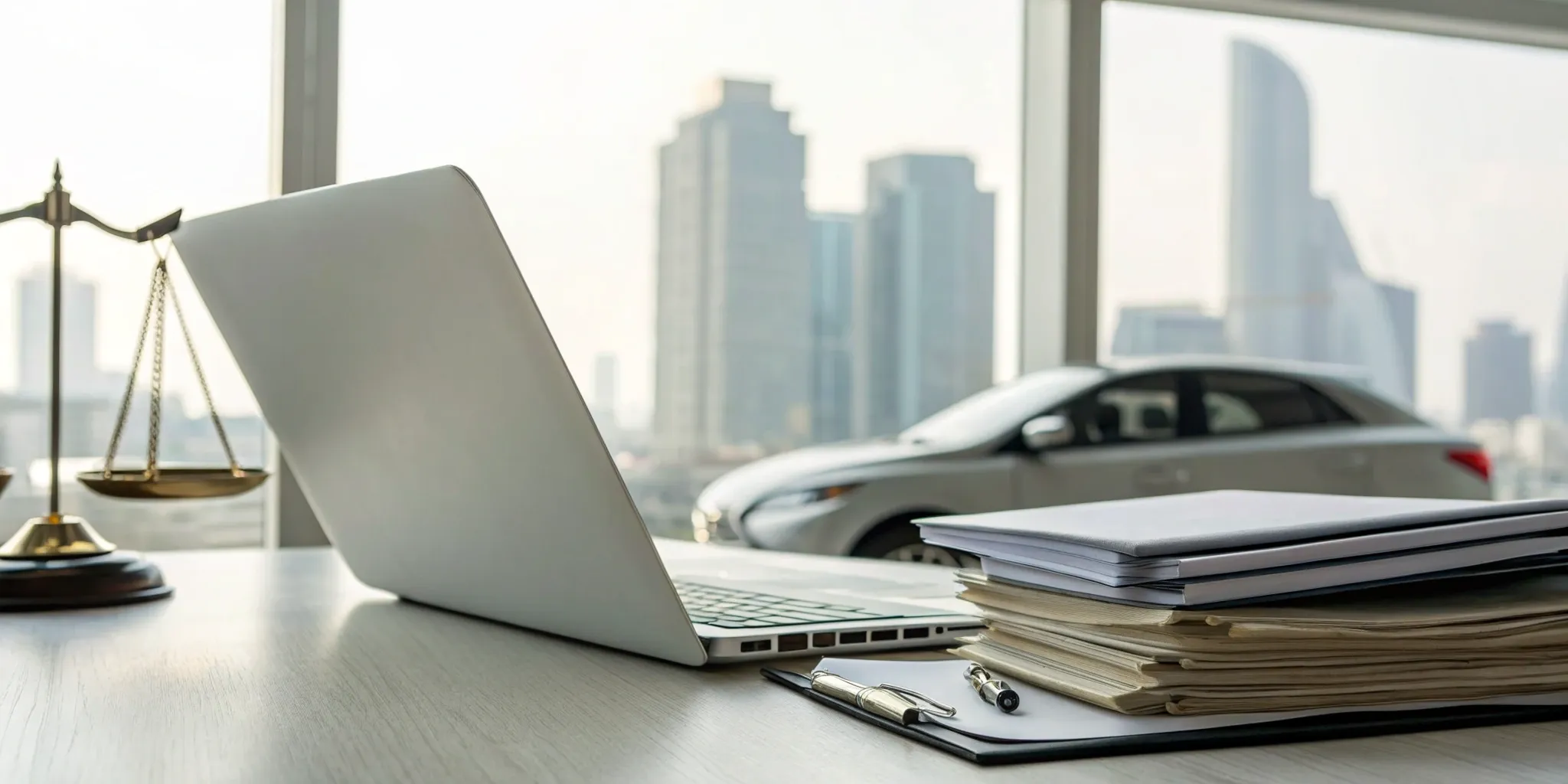A car accident is more than just a physical collision; it’s the start of a complex process involving insurance companies, medical bills, and potential legal claims. The actions you take in the minutes and hours after the incident can significantly affect your ability to receive fair compensation. Insurance adjusters are trained to minimize payouts, and a simple misstep on your part can be used against you. This guide on what to do after a car crash is designed to help you protect your rights from the very beginning. We’ll cover how to document the scene, what information to exchange, and how to communicate with insurers to ensure you don’t jeopardize your case while you focus on your recovery.
Key Takeaways
- Secure the Scene and Gather Proof: After checking for injuries and calling 911, your phone is your most important tool. Photograph everything—vehicle damage, license plates, insurance cards, and the surrounding area—to build a factual record of what happened.
- Get Medical Care, Even If You Feel Fine: Adrenaline can hide serious injuries that may not appear for hours or days. Seeking a prompt medical evaluation protects your long-term health and creates a crucial link between the crash and any injuries for your claim.
- Protect Your Claim by Being Careful with Your Words: Never admit fault at the scene. When speaking with insurance adjusters, stick to the basic facts and avoid giving a recorded statement until you fully understand your rights, preferably after speaking with an attorney.
What to Do Right After a Car Crash
The screech of tires, the jolt of impact—a car crash is a chaotic and frightening experience. In the moments that follow, your mind is racing, and it’s easy to feel overwhelmed. But what you do right after a crash is incredibly important for your safety, your health, and your ability to recover what you’ve lost. Taking a deep breath and following a few key steps can make all the difference. Think of this as your immediate action plan to get through the initial shock. Focus on these three priorities first: checking on everyone’s well-being, calling for help, and securing the scene to prevent any more harm.
Ensure Everyone’s Safety
Before you do anything else, take a moment to check on yourself and your passengers. Are you hurt? Adrenaline can mask pain, so do a careful mental scan. Once you’ve assessed yourself, check on anyone else in your car and, if it’s safe to do so, the people in the other vehicles involved. Your safety and the safety of others is the absolute top priority. If someone is seriously injured, try not to move them unless they are in immediate danger, like from a fire or oncoming traffic. Wait for emergency medical professionals to arrive, as they are trained to handle these situations without causing further injury.
Call 911
Even if the accident seems minor, you should always call 911. This call accomplishes two critical things: it dispatches police to the scene and gets medical help on the way for anyone who needs it. When the police arrive, they will create an official accident report, which is an essential piece of evidence. Answer the officer’s questions honestly, but stick to the facts of what happened. Avoid speculating or admitting fault. This police report will be a cornerstone of any future insurance or personal injury claim, providing an objective account of the incident.
Move to a Safe Area
If the accident was minor and your car is still drivable, the next step is to move it to a safe location, like the shoulder of the road. This helps prevent further accidents by clearing the way for traffic and emergency vehicles. Once you’ve moved your car, turn on your hazard lights to make sure you’re visible to other drivers. However, if your car is badly damaged and cannot be moved, leave it where it is. Your safety is more important than moving the vehicle. In this case, get yourself and any passengers to a safe spot away from traffic while you wait for help to arrive.
How to Document the Scene
After an accident, your memory can become fuzzy, and other parties might change their stories. That’s why the evidence you gather at the scene is so powerful. Think of yourself as a detective for your own case. The photos, notes, and contact information you collect create a factual record of what happened, which is essential for building a strong case. This documentation is one of the most important things you can do to protect your rights and support a potential personal injury claim. Insurance companies and legal teams rely on this initial evidence to piece together the events and determine fault. Without it, you’re left with a “he said, she said” situation that can be difficult to prove. Taking a few minutes to carefully document everything can make a significant difference in the outcome of your claim, ensuring you have the proof needed to get fair compensation for damages and injuries. It puts you in a position of control from the very beginning, providing your attorney with the concrete details they need to advocate effectively on your behalf. Remember, the moments after a crash are chaotic, but this is your one chance to capture the scene exactly as it is.
Take Plenty of Photos and Videos
Your phone is your best tool right now. Start taking photos and videos of everything, even if it seems minor. Capture the damage to all vehicles involved from multiple angles—get wide shots showing the cars’ positions, then close-ups of the specific points of impact. Photograph skid marks on the road, any relevant traffic signs or signals, and the overall weather and road conditions. If you have visible injuries, document those as well. According to GEICO’s accident guide, this visual evidence is critical for showing the full context of the crash to insurers and attorneys who weren’t there to see it for themselves.
Talk to Witnesses
Independent witnesses can be incredibly valuable because they offer an unbiased perspective. If anyone saw the accident, politely ask for their name and phone number. You don’t need a lengthy statement on the spot, but getting their contact information is key. Their account of what happened can help confirm your version of events and counter any incorrect statements from the other driver. As the California Department of Insurance advises, collecting details from witnesses is a critical step. A witness can often fill in crucial details that you may have missed in the heat of the moment. Make sure to note their details in your phone or on a piece of paper before they leave the scene.
Write Down Every Detail
While your memory is still fresh, jot down everything you can remember about the accident. Write down the time, date, and location. Note what you were doing right before the crash and the sequence of events as you recall them. If the police respond, be sure to get the officer’s name, badge number, and the police report number—this report is a vital piece of official documentation. Instead of just swapping phone numbers with the other driver, take a picture of their driver’s license, insurance card, and vehicle registration. This simple action ensures you have accurate information and prevents issues later on.
What Information to Exchange
Once you’ve confirmed everyone is safe and help is on the way, your next job is to collect information. I know your adrenaline is probably pumping, but taking a few minutes to calmly and thoroughly exchange details with the other driver is one of the most important things you can do. This information is the foundation for your insurance claim and any legal steps you may need to take later. Think of yourself as a reporter on the scene, gathering the essential facts. Use your phone to make it easy—take pictures of documents and type notes to keep everything organized.
Get the Other Driver’s Personal Details
First, you’ll need the other driver’s basic information. Ask for their full name, current address, and phone number. You also need their driver’s license number and the state it was issued in. The easiest way to get this right is to ask to see their physical license and take a clear photo of the front and back. While you’re at it, see if there are any passengers in the other vehicle and ask for their names and contact information, too. This information is critical if you need to file a personal injury claim, as it helps your representatives understand exactly who was involved in the incident.
Ask for Their Insurance Information
Next, you need to get the other driver’s car insurance details. Ask to see their insurance card and take a picture of it. You are looking for three key pieces of information: the name of their insurance provider, their policy number, and the phone number for the insurance company’s claims department. Don’t just jot it down; a photo ensures you capture everything accurately. Exchanging insurance information is a standard and expected part of any accident. It’s a necessary step for both you and the other driver to report the crash to your respective insurers. If you run into any issues or feel unsure about the process, you can always contact us for guidance.
Note Their Vehicle Information
Finally, gather all the relevant details about the other car involved in the crash. This includes the vehicle’s make, model, and color. Most importantly, get the license plate number and the state it’s registered in. A quick photo of the license plate is perfect. I also recommend taking a moment to walk around their car and note the specific damage it sustained. Where is the damage located? How severe does it look? You can take a few extra photos to document this. Having a clear record of their vehicle’s information and damage helps create a complete and accurate picture of what happened, which can be incredibly helpful down the line.
How to Report the Accident to Your Insurer
After the initial shock of a car crash wears off, one of the first calls you’ll need to make is to your insurance company. This step is critical for starting the claims process, but it’s also one where you need to be careful. Your insurer’s goal is to resolve the claim as efficiently as possible, which might not always align with ensuring you receive full compensation for your injuries and damages. Reporting the accident is a requirement, but how you do it matters. Stick to the facts, understand your policy, and remember that you are in control of the information you share.
Notify Your Insurer Promptly
It’s important to let your car insurance company know about the accident as soon as you can, even if you think the other driver was at fault or the damage seems minor. Most insurance policies have a clause that requires you to report any potential claim in a timely manner. Waiting too long could give them a reason to deny your claim.
A prompt report gets the process started and officially documents the incident under your policy. When you call, have your policy number ready. Simply state that you were in an accident, and provide the date, time, and location. You don’t need to give a detailed, recorded statement right away. If you’ve been injured, getting legal advice before you go into the details can help protect your personal injury claim.
Give Them the Essential Information
When you report the crash, your insurer will open a claim and assign an adjuster. You’ll need to provide the basic facts: your name, the names of others involved, their insurance information, and the police report number if one was filed. However, it’s wise to be cautious about what else you say. Stick to what you know for sure and avoid speculating about who was at fault or how the crash happened.
Crucially, do not downplay your injuries. It’s okay to say you’re seeking medical attention or are still assessing your condition. Adrenaline can mask pain, and some injuries don’t show up for days. Avoid giving a recorded statement until you’ve had a chance to process everything and speak with an attorney. You can always contact us for a free consultation to understand your rights before you talk to an adjuster.
Review Your Policy Coverage
Before or just after you call your insurer, take a moment to review your own insurance policy. Understanding what your policy covers will prepare you for conversations with the claims adjuster. Look for key coverages like collision, which pays for damage to your car, and medical payments (MedPay) or personal injury protection (PIP), which cover initial medical bills regardless of fault.
Also, check your limits for uninsured or underinsured motorist coverage. This is incredibly important if the at-fault driver has little or no insurance. Knowing your car insurance policy helps you understand what you’re entitled to claim. It can feel overwhelming, but being informed is the best way to advocate for yourself during the claims process.
Prioritize Your Health and Well-Being
After a car crash, nothing is more important than your health. The moments and days following an accident are critical for both your physical recovery and for documenting what happened. Even if you feel fine, adrenaline can mask serious injuries. Seeking prompt medical attention, keeping detailed records, and following your doctor’s orders are three of the most important steps you can take. These actions not only support your healing process but also create a clear and credible record, which is essential if you decide to file a personal injury claim. It’s easy to get overwhelmed by insurance calls and car repairs, but putting your well-being on the back burner can have long-term consequences for both your health and your ability to receive fair compensation. Remember, a damaged car can be replaced, but your health is invaluable. By focusing on your recovery, you also build the strongest possible case for yourself, showing the true impact the accident has had on your life.
Get Medical Help Immediately
Please see a doctor right away, even if you think your injuries are minor. Some symptoms don’t show up for hours or even days after a crash. Go to the hospital immediately if you experience loss of consciousness, severe pain, difficulty moving, or trouble breathing. Shock and adrenaline are powerful and can easily hide the extent of your injuries at the scene. Getting a professional medical evaluation as soon as possible ensures you receive the care you need and officially documents any harm you’ve sustained from the accident. This initial medical report is a crucial piece of evidence.
Keep a Record of Your Injuries
From your first doctor’s visit onward, it’s vital to keep a thorough record of your injuries and treatment. This documentation serves as the foundation for any future insurance claim or legal action. When a doctor officially diagnoses your injuries, it creates a direct link between the accident and the harm you suffered. This medical history helps prove the severity of your condition and justifies the need for compensation for any medical injury. Be sure to follow through with all recommended care, as this consistency demonstrates the seriousness of your injuries and your commitment to recovery.
Follow Your Doctor’s Treatment Plan
Following your doctor’s advice is non-negotiable for your recovery. Make sure you attend all follow-up appointments, complete physical therapy sessions, and take any prescribed medications. Sticking to your treatment plan is the best thing you can do for your health. It also protects your legal rights. Insurance companies may argue that you weren’t seriously hurt if you miss appointments or ignore medical advice. By diligently following your doctor’s plan, you show that you are taking your recovery seriously, which strengthens your case. If you have questions about how your treatment plan might affect your claim, it’s always a good idea to contact an attorney for guidance.
Protect Your Legal Rights
After a car crash, what you do and say can have a huge impact on your ability to get fair compensation for your injuries and damages. Insurance companies are businesses, and their primary goal is to protect their bottom line, not yours. Taking a few specific steps can safeguard your interests and ensure you have a strong foundation if you need to file a claim. It’s about being prepared and understanding that the moments after an accident are critical for your financial and legal future. Protecting your rights starts at the scene and continues through every conversation you have afterward.
Don’t Admit Fault
This is one of the most important rules to follow after a crash. In the shock and confusion of the moment, it’s natural to want to apologize, but you must resist the urge. Saying “I’m sorry” or “It was my fault” can be interpreted as an admission of legal guilt, even if you were just being polite. Fault is a complex legal issue that is determined after a full investigation, not by drivers at the scene. When you talk to the police and the other driver, stick strictly to the facts of what happened. Describe events from your perspective without assigning blame to yourself or anyone else. Let the evidence and the professionals sort out who is responsible.
Be Careful What You Say to Adjusters
Soon after the accident, you will likely get a call from the other driver’s insurance adjuster. Be very careful. Their job is to settle the claim for the lowest amount possible. They may sound friendly and helpful, but they are looking for information that can be used to minimize or deny your claim. You are not required to give them a recorded statement, and it’s often best not to until you’ve spoken with an attorney. Provide them with only basic information and avoid discussing the details of your injuries or speculating on the cause of the crash. An experienced lawyer can handle these communications for you, ensuring your rights are protected throughout the personal injury claim process.
Talk to a Personal Injury Attorney
Navigating the aftermath of a car accident is complicated, and you don’t have to do it alone. Speaking with a personal injury attorney as soon as possible is the best way to protect your rights. An attorney can explain your options, handle all communication with insurance companies, and make sure you meet important deadlines for filing a claim. They work to gather all the necessary evidence to build a strong case on your behalf. At Counsel Hound, we offer a free consultation to discuss your case and operate on a “no fees until we win” basis, so there’s no financial risk to you. Getting professional legal advice ensures you can focus on your recovery while we handle the fight for fair compensation.
Common Mistakes to Avoid
In the stressful moments after a car crash, it’s easy to make a mistake that could impact your health, your finances, and your ability to get fair compensation. Knowing what not to do is just as critical as knowing what to do. Steering clear of these common errors can help you protect your rights and build a stronger foundation for your insurance claim or potential legal case. Let’s walk through the most frequent missteps so you can feel more prepared and in control if you ever find yourself in this situation.
Don’t Leave the Scene
Your first instinct might be to get away from the stressful situation, but leaving the scene of an accident is one of the worst things you can do. You are legally required to stop, check on the other people involved, and exchange information. Fleeing, especially if someone is hurt, can lead to serious criminal charges, like a hit-and-run. Even if the crash seems minor, stay put until you’ve spoken with the other driver and the police have arrived and given you the all-clear to go. This is a critical step in protecting yourself and your rights in any future personal injury claim.
Always File a Police Report
Even for a fender bender in a parking lot, you should always try to get a police report. While it’s true that police may not respond to extremely minor incidents, making the call is essential. A police report is an official, unbiased document that records the facts of the accident. It will include details like the date, time, location, parties involved, witness statements, and often the officer’s initial assessment of what happened. Without this report, your claim can become a messy “he said, she said” situation, making it much harder for your insurance company or attorney to advocate on your behalf.
Never Downplay Your Injuries
Right after a crash, adrenaline and shock can mask pain. You might feel fine, but that doesn’t mean you aren’t hurt. Avoid saying things like “I’m okay” or “I’m not injured” at the scene. Instead, it’s better to say you plan to get checked out by a doctor. Serious issues like whiplash, concussions, or internal injuries can take hours or even days to become apparent. If you tell the insurance company you weren’t hurt, they may use that statement against you later to deny or reduce your claim for a medical injury that appeared later. Always prioritize getting a medical evaluation.
Document Everything
Your phone is one of the most powerful tools you have after an accident. Use it to document what happened thoroughly. Take photos and videos from every angle, capturing the damage to all vehicles, their license plates, and their positions on the road. Get wider shots of the entire scene, including any skid marks, debris, traffic signals, or relevant road signs. If you have visible injuries, photograph those as well. This visual evidence is incredibly difficult for insurance companies to dispute and provides your attorney with concrete proof to support your version of events. Make sure you also get the police report number before you leave.
Your Next Practical Steps
Once the immediate crisis at the scene is over, you’ll need to deal with the aftermath. This can feel overwhelming, but breaking it down into smaller, manageable tasks makes it much easier. Focus on handling your vehicle, notifying the right people, and, most importantly, taking care of yourself. These next steps are about getting your life back in order while protecting your rights.
Arrange for Towing and Repairs
If your car isn’t safe to drive, your first call should be for roadside assistance to get it towed. You have the right to choose any repair shop you trust to fix your car. While your insurance company might recommend a specific shop, you are not obligated to use it. However, if you do go with an insurer-recommended facility, they are typically required to guarantee the repairs are done correctly without extra cost to you, beyond your policy’s terms. This can give you some peace of mind as you handle the logistics of a personal injury claim.
Handle Your Work and Personal Life
It’s crucial to notify your insurance company about the accident as soon as possible, regardless of who was at fault. Giving your agent a prompt heads-up helps get the claims process started and ensures you have a formal record of the incident. You’ll also need to think about your other obligations. If you’re injured or need time to deal with the accident’s fallout, let your employer know. Keeping everyone informed helps manage expectations and gives you the space you need to recover. If you’re unsure how to talk to insurers, you can always contact us for a free consultation first.
Manage the Emotional Toll
After a crash, shock and adrenaline can easily mask pain. You might not feel hurt right away, but injuries can surface hours or even days later. Because of this, it’s always a good idea to see a doctor for a full check-up, even if you feel fine. A medical professional can identify underlying issues you might not be aware of. Prioritizing your health is the most important step you can take. A medical report also creates an official record of any injuries, which is essential if you’ve suffered a medical injury as a result of the accident.
Your Long-Term Recovery Checklist
Once the initial shock of the crash wears off, you’ll find yourself dealing with the longer-term consequences. This phase is all about managing the details, from medical bills to insurance claims, to make sure you’re on the right path to recovery. It can feel like a lot to handle, but staying organized is one of the best things you can do for yourself. A clear record of your journey—your expenses, your communications, and your medical treatment—is essential for building a strong case and ensuring you receive the compensation you deserve. Think of this checklist as your guide to staying on top of everything while you focus on getting better.
Track All Your Expenses and Losses
After a crash, expenses can pile up quickly. It’s so important to keep a detailed record of every single cost. This includes medical bills, prescription receipts, car repair estimates, and even the cost of transportation if you can’t use your car. Did you have to miss work? Keep track of your lost wages. If your car was totaled, the insurance payment might not cover your entire auto loan. You are still responsible for the remaining balance, which is where “gap” insurance can be a lifesaver. Keeping meticulous records will be crucial when seeking fair personal injury compensation. Start a folder or a spreadsheet and update it regularly—you’ll be glad you did.
Follow Up on Your Insurance Claim
Don’t wait for the insurance company to call you. Be proactive. After you file a claim, your insurer should contact you within a reasonable period, which is often defined as about 15 days. If you don’t hear from them, pick up the phone and follow up. Always keep your own insurance company in the loop, as your policy might include coverage that can help with repairs or medical costs. Giving them all the details helps them protect you. If you feel like the insurance company is giving you the runaround or not treating you fairly, it might be time to contact an attorney who can advocate on your behalf.
Address Any Ongoing Medical Care
Your health is the top priority, and recovery can be a long road. Some injuries don’t show up right away due to shock and adrenaline, so symptoms can appear hours or even days later. That’s why it’s smart to see a doctor even if you feel fine immediately after the accident. Injuries like internal bleeding or soft tissue damage might not have obvious signs at first. Following through with all recommended treatments, physical therapy, and follow-up appointments is critical. This not only helps you heal but also creates an official record of your medical injury and its impact on your life, which is vital for your claim.
Know Your Rights After a Crash
After a car crash, you’re likely feeling shaken and overwhelmed. In the middle of the chaos, it’s easy to forget that you have specific rights that are designed to protect you. Understanding these rights is your first line of defense, empowering you to take the correct steps to look after your health, finances, and future well-being. It’s the difference between being a passive participant and an active advocate for your own recovery.
Insurance companies have teams of people working to protect their bottom line, and their goals may not align with yours. Knowing your rights helps level the playing field. It gives you the confidence to push back on lowball settlement offers and ensures you don’t accidentally say something that could harm your claim. From the moment the accident happens, you have the right to report it, seek medical care without delay, and pursue fair compensation for all your losses. These aren’t just suggestions; they are fundamental protections. By familiarizing yourself with them, you can navigate the post-accident process with greater clarity and make sure your voice is heard.
Your Right to Report the Accident
You have the right to have an official record of the accident. This is why you should always call the police. Even for what seems like a minor fender-bender in a parking lot, an official police report is an invaluable piece of evidence. While it’s true that in some areas police may not respond to accidents on private property or without injuries, you should still make the call and document that you tried. This report creates an objective, third-party account of the incident, which is crucial when dealing with insurance companies. It establishes the time, location, and basic facts of the crash, which can help support your personal injury claim later on.
Your Right to Seek Medical Care
Your health is the top priority, and you have an absolute right to seek medical attention. If you have obvious injuries, severe pain, or trouble breathing, go to the hospital immediately. But even if you feel fine, it’s wise to get checked out by a doctor. The adrenaline from a crash can mask pain, and some serious conditions, like internal bleeding or soft tissue damage, don’t show symptoms right away. Seeing a doctor creates a medical record that connects any injuries to the accident. This documentation is essential if you need to file a claim for a medical injury and prove that your health issues were a direct result of the crash.
Your Right to Fair Compensation
You have the right to be compensated for the damages and losses you suffered because of the accident. This includes repairs to your vehicle, medical bills, lost wages from time off work, and pain and suffering. Insurance companies will typically offer to pay for repairs or the “actual cash value” of your car—whichever is lower. Even if the accident wasn’t your fault, you should still file a claim with your own insurer. They can help manage the process and protect your interests. Understanding what constitutes fair compensation can be complex, which is why it’s often helpful to get a free consultation to discuss your case with an experienced attorney.
Related Articles
- 10 Things You Should Do After A Car Accident | Counsel Hound
- Protecting Yourself Financially After A Car Accident | Counsel Hound
- In a Car Accident? Here’s Exactly What to Do Next in Alabama | Counsel Hound
- What To Do After A Multiple Vehicle Accident | Counsel Hound
- The Importance of Involving the Police After an Accident: A Comprehensive Guide | Counsel Hound
Frequently Asked Questions
What if I feel fine after the crash? Should I still see a doctor? Yes, you absolutely should. The shock and adrenaline from a car crash can easily mask pain, and some serious injuries, like whiplash or concussions, may not show symptoms for hours or even days. Getting a medical evaluation creates an official record that connects any injuries directly to the accident. This documentation is one of the most important pieces of evidence you can have if you need to file a personal injury claim later on.
The other driver’s insurance adjuster offered me a quick settlement. Should I take it? You should be very cautious with early settlement offers. Insurance companies often try to resolve claims quickly and for the lowest amount possible. An initial offer rarely accounts for the full extent of your future medical bills, lost wages, or pain and suffering. Once you accept a settlement, you lose the right to ask for more money, even if your injuries turn out to be more serious than you first thought. It’s always best to understand the full scope of your damages before signing anything.
What happens if the other driver doesn’t have insurance or their coverage isn’t enough? This is a stressful but common situation. If the at-fault driver is uninsured or underinsured, your own auto insurance policy may be able to help. This is where your Uninsured/Underinsured Motorist (UM/UIM) coverage comes into play. This specific part of your policy is designed to cover your expenses in this exact scenario. Dealing with your own insurer for a UM/UIM claim can still be complicated, so it’s a good time to understand your rights.
At what point should I consider talking to a personal injury attorney? The sooner, the better, especially if you were injured. An attorney can immediately take over communication with the insurance companies, protecting you from saying something that could harm your case. They can help you meet important deadlines and ensure all evidence is preserved correctly. Getting professional advice early allows you to focus completely on your recovery while someone else handles the legal complexities. You can always contact us for a free discussion about your situation.
How much will it cost me to hire an attorney from Counsel Hound? There is no upfront cost to you. We work on a contingency fee basis, which is our “no fees until we win” promise. This means we only get paid if we successfully win or settle your case. Your initial consultation is completely free, so you can get legal advice and understand your options without any financial risk or obligation. We cover all the costs of building your case, and our fee is a percentage of the final recovery.





